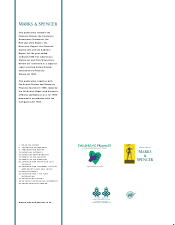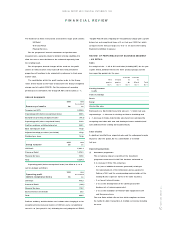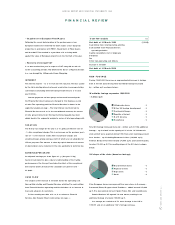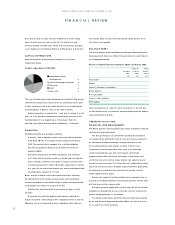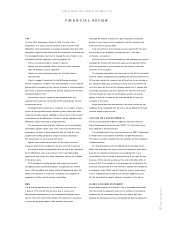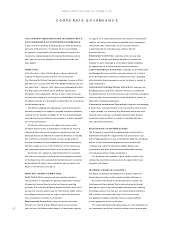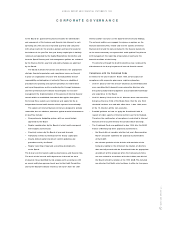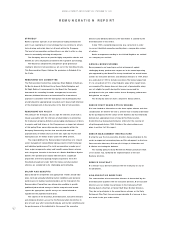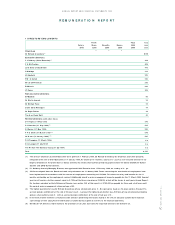Marks and Spencer 1999 Annual Report Download - page 10
Download and view the complete annual report
Please find page 10 of the 1999 Marks and Spencer annual report below. You can navigate through the pages in the report by either clicking on the pages listed below, or by using the keyword search tool below to find specific information within the annual report.
ANNUAL REPORT AND FIN ANCIAL STATEMENTS 1999
8
REMUN ERATIO N REPO RT
STRATEGY
Marks & Spencer operates in an international trading environment
and it is an essential part of our strategy that we continue to attract,
train, develop and retain talent at all levels within the Company.
The level of remuneration and benefits we are able to offer is a key
factor in successfully achieving this objective.
The Company sets out to provide highly competitive salaries and
benefits for all its employees consistent with its growth and strategy.
The Board has adopted the principles of good governance
relating to directors’ remuneration as set out in the Combined Code.
This Remuneration Report follows the provisions in Schedule B to
the Code.
REMUN ERATION COMMITTEE
The Remuneration Committee comprises Brian Baldock (Chairman),
Sir Martin Jacomb, Sir Michael Perry, Dame Stella Rimington and
Sir Ralph Robins. It recommends to the Board the Company’s
framework for rewarding its senior management, ie executive
directors, divisional directors and executives.The Committee’s
approach is consistent with the Company’s overall philosophy that
all staff should be appropriately rewarded and it keeps itself informed
of the developments in best practice in the field of remuneration.
REMUN ERATION POLICY
The policy of the Company aims to align the interests of all staff as
closely as possible with the interests of shareholders in promoting
the Company’s progress. Schemes encouraging employees at all levels
to acquire and hold shares in the Company are an important element
of that policy. Share ownership remains very popular within the
Company, illustrated by the fact that over 42,000 staff hold
approximately 30 million shares in their own right and 33,000 staff
hold options on 61 million shares under the SAYE scheme.
The responsibility of the Remuneration Committee is to reward
senior management competitively taking account of both Company
and individual performance.The total remuneration is made up of
three major components: salary and benefits, annual bonus scheme
and a long-term incentive in the form of a Senior Staff Share O ption
Scheme.The performance related elements form a significant
proportion of the total package.Targets required to meet the
thresholds of payment under both the bonus and share option
schemes are considered to be challenging and motivating.
SALARY AND BEN EFITS
Salary should be competitive and appropriate reviews should take
place, normally annually, reflecting market conditions and personal
performance. In making recommendations on the framework the
Remuneration Committee uses information available in specific
published job-matched surveys of similar companies and annual
reports.As appropriate, specific surveys are commissioned to
supplement the published information.
The salaries of the Chairman, Chief Executive, executive directors
and divisional directors, are set by the Remuneration Committee in
June of each year after reviewing Company and market conditions and
the performance of the individual. In the cases of the executive
directors and divisional directors, the Committee is assisted by the
Chief Executive in this review.
In July 1998 a repositioning exercise was carried out in order
to correct identified anomalies resulting from a comparative review
of salaries.
Senior management working in the United Kingdom are entitled
to a company car and fuel.
ANN UAL BONUS SCHEME
Bonus payments are based upon actual achievement against
challenging Group performance targets set in the annual operating
plan approved by the Board.The Group introduced an annual bonus
scheme for executive directors and divisional directors in 1988, which
was extended in 1995 to include executives.The bonus ranges from
0% to a maximum of 30% of participants’ salary when target levels
are exceeded.The bonus does not form part of pensionable salary,
nor is it eligible for profit sharing. N o bonus was earned by
participants in the year under review due to Company performance
being below set targets.
The Company does not have a long-term bonus scheme.
SENIOR STAFF SHARE OPTION SCHEME
W e have looked at alternatives to the share option scheme and after
consideration we believe we have a scheme that is readily understood
by the participants, fits the culture of the business and has historically
delivered an appropriate level of reward.The Remuneration
Committee has imposed performance criteria for the exercise of
all options granted since 1996. D etails of the share schemes are
given in section 5 of this report.
SENIOR MANAGEMENT RESTRUCTURE
D uring the year the non-executive directors have participated in the
senior management succession plans and the subsequent restructure.
Four executive directors, J K O ates, D K Hayes, C Littmoden and
S JSacher are leaving the business.
The existing policy for Early Retirement Pension, details of which
are in section 3(ii), facilitated the implementation of the new
Business structure.
SERVICE CONTRACT
N o director has a Service Contract with the Company or any of
its subsidiaries.
NON-EXECUTIVE DIRECTORS
The remuneration of non-executive directors is determined by the
Chief Executive together with the executive directors. N on-executive
directors are not invited to participate in the Company’s Profit
Sharing, Save As You Earn or Senior Staff Share O ption Schemes.
They do not participate in the annual bonus scheme or the Early
Retirement Plan.Their fees are non-pensionable. N o increase in fees
was made in the year under review.


